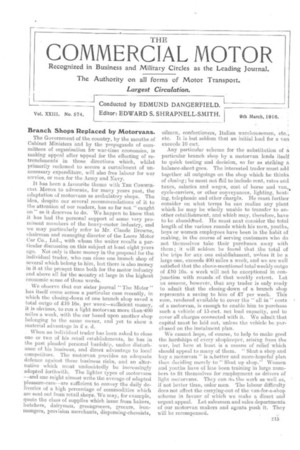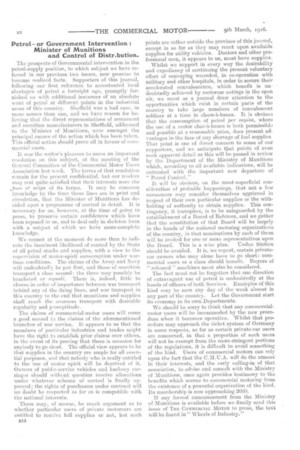Branch Shops Replaced by Motorvans.
Page 1

Page 2

If you've noticed an error in this article please click here to report it so we can fix it.
The Government of the country, by the mouths of Cabinet Ministers and by the propaganda of committees of organizration far war-time economies, is making appeal after appeal for the effecting of retrenchments' in those directions which, whilst primarily reckoned to secure a curtailment of unnecessary expenditure, will also free labour for war service, or men for the Army and Navy.
It has been a favourite theme with THE COMMERCIAL MOTOR to advocate, for many years past, the adaptation of motorvans as ambulatory shops. The idea, despite our several recommendations of it to the attention of our readers, has so far not "caught on" as it deserves to do. We happen to know that it has had the personal support of -some, very prominent members of the heavy-motor industry, and we may particularly refer to Mr. Claude Browne, chairman and managing director of the Lacre Motor Car Co., Ltd., with whom the writer recalls a particular discussion on this subject at least eight years ago. Not only is there money in the proposal for the individual trader, who can close one branch shop of Several which belong to him, but there is also money in it at the present time both for the motor industry and above all for the aountry at large in the highest ecouomie sense of those words.
We observe that our sister journal "The Motor" has itself come across a particular case recently, in which the closing-down of one branch shop saved a total outgo of £10 16s. per week—sufficient money; it is obvious, to run a light motorvan more than 400 Miles a week, with the car based upon another shop belonging to the same owner, and yet to show a material advantage in s. d.
When an individual trader has been asked to close one or two of his retail establishments, he has in the past pleaded personal hardship, undue disturbance of his business, and direct advantage to local competitors. The motorvan provides an adequate defence against these business risks, and an alternative which must undoubtedly be increasingly adopsted forthwith. The lighter types of motorvans —and one might. almost write the average of adapted pleasure-cars—are sufficient to convey the daily deliveries of a high percentage of commodities which are sent out from retail shops. We may, for example, quote the class of supplies which issue from bakers, butchers, dairymen, greengrocers, grocers, ironmongers, provision merchants, dispensing-chemists, oilmen, confectioners, Italian warehousemen, etc.-, etc. It is but seldom that an initial load for a van exceeds 10 cwt.
Any particular scheme for the substitution of a particular branch shop by a motorvan lends itself to quick testing and decision, so far as striking a balance-sheet goes. The interested trader must add together. all outgoings on the shop which he thinks of closing; he must not flail to include rent, rates and taxes, salaries and wages, cost of horse and van,. cycle-carriers, or other coveyances, lighting, heat lug, telephonic and other mares. He must further consider on what ternas he can realize any plant which he may be wholly unable to transfer to an other establishment, and which may, therefore, have to be abanddned. He must next consider the total length of the various rounds which his men, youths, boys or women employees have been in the habit of making, in the course of serving customers who do not themselves take their purchases, away with them ; it will seldom be found that , the total of the trips for any one establishment, unless it be a large one, exceeds 400 miles a week, and we are well satisfied that the above-mentioned total weekly outgo of DO 16s. a week will not bp exceptional in con junction with rounds of that weekly extent. Let us assume, however, that any trader is only. ready to admit that the closing-down of a branch shop represents a saving to him of £7 per week. This sum, rendered available to cover the " all in" costs of a motorvan, is enough to enable him to purchase such a vehicle of D.-cwt. net load capacity, and to cover all charges connected with it. We admit that capital must be laid out, unless the vehicle be purchased on the instalment plan.
We cannot hope, of course, to help to make good the hardships of every shopkeeper, arising from the war, but here at least is a means of relief which should appeal to many of them. "Shut a shop and buy a motorvan'' is a better and more-hopeful plan than deciding merely to " Shut up shop." Women and youths have of late been training in large numbers to fit themselves for employment as drivers of light motorvans. They can df, the work as well as, if not better than, cider men. The labour difficulty does not affect the carrying-out of the van-for-a-shop scheme in favour of which we make a direct and urgent appeal. -Let salesmen and sales departments of our motorvan makers and agents push it. They will be recompensed.
Petrolor Government Intervention : Minister of Munitions and Control of Distribution.
The prospects of Governmental intervention in the petrol-supply position, to which subject we have referred in our previous two issues, now promise to become realized facts. Supporters of this journal, following our first reference to accentuated local shortages of petrol a fortnight ago, promptly furnished us with additional instances of an absolute want of petrol at different points in the industrial areas of this country. Sheffield was a bad case, in more senses than one, and we have reason for believing that the direct representations of armament ae-1 munition manufacturers in Sheffield, addressed to the Minister of Munitions, were amongst the principal causes of the action which has been taken. This official action should prove all in favour of commercial users.
It was the writer's pleasure to move an important resolution on this subject, at the meeting of the General Committee of the Commercial Motor Users Association last week. The terms of that resolution remain for the present confidential, but our readers may rest quite satisfied that their interests were the Jons et origo of its terms. It may be common. knowledge by the time these lines are in print and circulation, that the Minister of Munitions has decided upon a programme of control in detail. It is necessary for us, however, at the time of going to press, to preserve certain confidences which have been reposed in us, and to deal only in skeleton form with a subject of which we have more-complete knowledge.
We cannot at the moment do more than to indicate the imminent likelihood of control by the State of all petrol stocks and supplies, with a view to the supervision of motor-spirit consumption under wartime conditions. The claims of the Army and Navy will undoubtedly be put first, and those of munition transport a close second: the three may possibly be bracketed ex ccquali. There is, indeed, little to choose in order of importance between war transport behind any of the -firing lines, and war transport in this country to the end that munitions and supplies shall reach the overseas transport with desirable regularity and vi.om pti t ode .
The claims of commercial-motor users will come a good second to the claims of the aforementioned branches of war service. It appears to us that the members of particular industries and trades might have the right to establish prior claims over others, in the event of its proving that there is occasion for anybody to go short. The official view appears to be that supplies in the country are ample for all essential purposes, and that nobody who is really entitled to the use of motor spirit will be deprived of it. Owners of public-service vehicles. and hackney carriages should without question receive allocations under whatever scheme of control is finally approved; the rights of purchasers under contract will no doubt be respected as far as is compatible with the national interests.
There may, of course, be much argument as to whether particular users of private motorcars are entitled to receive full supplies or not, but such points are rather outside the province of this journal, except in so far as they may react upon available supplies for utility vehicles. Doctors and other pro fessional men, it appears to us, must have supplies. Whilst we support in every way the desirability and expediency of continuing the present voluntary effort of conveying wounded, in co-operation with military and other hospitals, in order to secure their accelerated convalescence, which benefit is un doubtedly achieved by motorcar outings in the open air, we must as a journal draw attention to the opportunities which exist in certain parts of the country to take large numbers of convalescent soldiers at a time in chars-a-bancs. It is obvious that the consumption of petrol per capita, where the use of a motor char-h-hancs is both permissible: and possible at a reasonable price, does present advantages in the face of any shortage of fuel supplies That point is one of direct concern to some of our supporters, and we anticipate that points of even such apparent detail as this will be passed in review by the Department of the Ministry of Munitions which, according to all available indications, will be entrusted with the important new departure of "Petrol Control."
It will be obvious, on the most-superficial consideration of probable happenings, that not a few consumers may consider themselves aggrieved in respect of their own particular supplies or the withholding of authority to obtain supplies. This con tingency, it transpires, is to be safeguarded by the establishment of a Board of Referees, and we gather that the constitution of that Board will be largely in the hands of the national motoring organizations of the country, in that nominations by each of them will be in vited for one or more representatives upon the Board. This is a wise plan. Undue friction should be avoided. It is, we repeat, certain private. car owners who may alone have to go short : commercial users as a class should benefit. Buyers of " released " machines must also be considered.
The fact must not be forgotten that one direction of extravagant use of petrol is undoubtedly at the hands of officers of both Services. Exarnples of this kind may be seen any day of the week almost in any part of the country. Let the Government start its economy in its own Departments.
We should be sorry to think that any commercialmotor users will be incommoded by the new proce dure when it becomes operative. Whilst that pro cedure may approach the ticket system of Germany in some respects, so far as certain private-car users are concerned, in that a proportion of such users will not be exempt from the more-stringent portions of the regulations, it is difficult to avoid something of the kind. Users of commercial motors can rely upon the fact that the C.3/1.U.A. will do the utmost in their interests, and the early calling-in of that association, to advise and consult with the Ministry of Munitions, once again provides testimony to the benefits which accrue to commercial motoring from the existence of a powerful organization of the kind. Its membership is now approaching 2000.
If any formal announcement from the Ministry of Munitions is available before we finally send this issue of THE COMMERCIAL MOTOR to press, the text will be found in" Wheels of Industry."






















